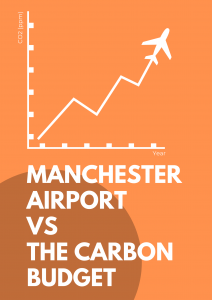A new report calls on Manchester City Council (MCC) to introduce a moratorium on further airport expansion (including car park spaces), a commitment to a frequent flyer departure tax, further work to assses aviation emissions within the city-wide carbon budget and a transparent assessment of its climate-related financial risks.
 Next week on 9th Dec 2021 at 10am the Environment and Climate Change Scrutiny committee will receive its first report related to Aviation and Carbon Emissions from the “Manchester Climate Change Agency” and Manchester Airports Group (MAG).
Next week on 9th Dec 2021 at 10am the Environment and Climate Change Scrutiny committee will receive its first report related to Aviation and Carbon Emissions from the “Manchester Climate Change Agency” and Manchester Airports Group (MAG).
Climate Emergency Manchester has produced a report that introduces concerned citizens to and exposes issue of MAG and MCC continuing to promote and expand a carbon-intensive asset in the time of a climate emergency with an ever-shrinking carbon emissions budget for the city and its residents.
The report’s key recommendations are:
 1 – A moratorium on airport expansion, including car park spaces and commit to create a departure tax levied by MCC / GMCA for frequent flyers. MAG’s growth strategy is not compatible with the target to align aviation emissions with the Paris agreement, particularly in light of the Climate Change Committee’s proposed Sixth Carbon Budget, which recommends that aviation emissions in 2030 should be 20% below 2019 levels, without carbon offsetting or removal. In addition, car parking is one of the most important sources of revenue for MAG. This is incompatible with reduction of direct emissions of CO2. Lastly, sustainable aviation technology is not advanced sufficiently to significantly reduce emissions before 2030. You can’t expand the airport in the next decade without increasing emissions.
1 – A moratorium on airport expansion, including car park spaces and commit to create a departure tax levied by MCC / GMCA for frequent flyers. MAG’s growth strategy is not compatible with the target to align aviation emissions with the Paris agreement, particularly in light of the Climate Change Committee’s proposed Sixth Carbon Budget, which recommends that aviation emissions in 2030 should be 20% below 2019 levels, without carbon offsetting or removal. In addition, car parking is one of the most important sources of revenue for MAG. This is incompatible with reduction of direct emissions of CO2. Lastly, sustainable aviation technology is not advanced sufficiently to significantly reduce emissions before 2030. You can’t expand the airport in the next decade without increasing emissions.
 2 – Create an integrated direct and aviation carbon budget. Commissioning the “alternative calculation method” recommended by the Tyndall Centre in 2020 “would enable a more accurate allocation of emissions of Manchester’s residents and better reflect any changes in the destinations served by Manchester Airport and the performance of aircraft on these routes.”. The current carbon budget is based on the premise that emissions from flights departing UK airports remain at 2018 levels to 2030 and then decrease to zero. Furthermore, there is no accurate representation of the carbon budget for aviation and how it aligns with the 15MtCO2 direct emissions budget. Budgets for aviation and non-aviation are not “equivalent and exchangeable”. If aviation emissions increase, the direct emissions budget will need to decrease, impacting a just transition for the majority of Manchester residents who do not frequently fly. As emissions that contribute to global heating are cumulative, they need to be reduced in the short term.
2 – Create an integrated direct and aviation carbon budget. Commissioning the “alternative calculation method” recommended by the Tyndall Centre in 2020 “would enable a more accurate allocation of emissions of Manchester’s residents and better reflect any changes in the destinations served by Manchester Airport and the performance of aircraft on these routes.”. The current carbon budget is based on the premise that emissions from flights departing UK airports remain at 2018 levels to 2030 and then decrease to zero. Furthermore, there is no accurate representation of the carbon budget for aviation and how it aligns with the 15MtCO2 direct emissions budget. Budgets for aviation and non-aviation are not “equivalent and exchangeable”. If aviation emissions increase, the direct emissions budget will need to decrease, impacting a just transition for the majority of Manchester residents who do not frequently fly. As emissions that contribute to global heating are cumulative, they need to be reduced in the short term.
 3 – More transparent assessment and disclosure of risks to profits, growth and impact of bailout costs/loan repayments on MCC’s budget. With the pandemic far from over and increasing global pressure for quicker rates of decarbonisation, airport revenue streams may not be as reliable as they previously were – future investment will be at greater risk. Passenger numbers are expected to stay low for at least the next 3 years and may never reach pre-2020 levels. MCC’s investment in MAG needs to be seen as a financial and environmental risk as well as a historic asset on the council’s balance sheet.
3 – More transparent assessment and disclosure of risks to profits, growth and impact of bailout costs/loan repayments on MCC’s budget. With the pandemic far from over and increasing global pressure for quicker rates of decarbonisation, airport revenue streams may not be as reliable as they previously were – future investment will be at greater risk. Passenger numbers are expected to stay low for at least the next 3 years and may never reach pre-2020 levels. MCC’s investment in MAG needs to be seen as a financial and environmental risk as well as a historic asset on the council’s balance sheet.
The full report can be downloaded here. The report being discussed next week on 9th Dec at 10:00 by MCC can be found here and watched live in person or online here.

Brilliant stuff. Thanks for your hard work on this. Will the council listen? Unlikely…
Cheers Marc!